J. Owen Huntsman was a real Hoosier. Born in Mount Vernon, he attended Earlham College in Richmond, graduating in 1926. A multi-sport athlete, he coached football and track, and headed the school’s physical education department from 1935 to 1949. At Wabash College in Crawfordsville, Huntsman stuck to track and cross country, not retiring until 1971.
His son Jerry threw the javelin and played quarterback for the Little Giants. (This is the greatest nickname in all of college sports. You can have your SMU Mustangs, your Alaska Nanooks, your Iona Gaels and your North Carolina State 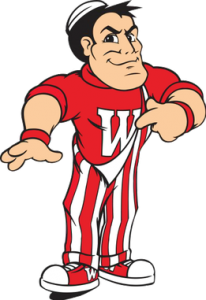 Wolfpack, but they do not compare with the Wabash Little Giants.) He earned a master’s degree at Purdue, and then coached football at Earlham and Indiana State between 1961 and 1972, compiling a record of 72-27-1. Jerry was strictly a football man, although he did coach basketball at a couple of Indiana high schools early on. He stayed at ISU as an assistant athletic director for another decade.
Wolfpack, but they do not compare with the Wabash Little Giants.) He earned a master’s degree at Purdue, and then coached football at Earlham and Indiana State between 1961 and 1972, compiling a record of 72-27-1. Jerry was strictly a football man, although he did coach basketball at a couple of Indiana high schools early on. He stayed at ISU as an assistant athletic director for another decade.
J. Owen Huntsman’s other son, and Jerry’s brother, Stan, would outdo both of them. He was an all-state fullback at Richmond and Crawfordsville. While he might have taken his chances at Purdue, Indiana, Notre Dame or one of the other big-time universities in the Midwest, Huntsman picked WC, an all-male, liberal arts school; even today, academe takes precedence over partying. His football coach was Garland Frazier, and the team did quite well. The red and white went undefeated in 1951, when Jerry was still the QB. Huntsman, the younger one, was Wabash’s MVP in his junior and senior seasons. In a game against Ball State in 1952, he scored five touchdowns. Also in ’52, he gained 259 yards against DePauw and threw a TD pass. And in 1953, he thrilled the fans at Ingalls Field by scoring on a 97-yard kickoff return.
The Chicago Cardinals of the NFL took him in the 20th round of the 1954 draft, but Huntsman decided he had played his last football game. A decathlete—jack of all trades but master of none—on his father’s track & field team all four years at Wabash, he saw his future in that sport. While working on a master’s at Ohio University, Huntsman assisted in both football and track, and taught PE. Among the students in a coeducational summer swimming class was a bright Italian-American named Sylvia Scalzi; their marriage would last 52 years, and produce a son and a daughter.
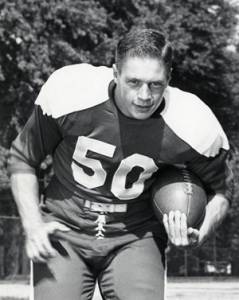
Huntsman took over as head coach of the Bobcats’ track and cross-country teams in 1956. His days as an athlete were not quite over, as he stayed in shape and took part in the decathlon segment of the ’56 Olympic trials. Huntsman did not make the team, finishing 9th, but the Americans were the best in the world. Milton Campbell and Rafer Johnson took gold and silver, respectively, at Melbourne four months later.
Rather than recite a long list of the years in which Huntsman’s OU athletes won Mid-America Conference titles and how they did in the NCAA’s or the Drake, Penn, Kansas and Texas Relays and AAU meets, I will tell the following story. It pertains to the Boston Marathon, the USA’s oldest and most prestigious marathon. In 1964, there were fewer than 500 entrants—a far cry from the modern average of 30,000. Still, Boston was the holy grail for most marathoners. (I did it in 1995.) Even in 1964, it had an international field; the top ten finishers included five Japanese, two Finns, two Americans and a Belgian. Four members of Huntsman’s cross-country team started doing 10-, 15- and 20-mile runs, and entered. He was supportive and encouraged his guys to go to Boston and do their best. Huntsman visited a local shop and had four singlets saying “Ohio Marathon Club” custom made. In their first 26.2-mile race, Larry Smith came in 22nd, Steve Radcliffe 36th, Alex Jamieson 47th and Al Trammell 64th.
The University of Tennessee was a major step up from Wabash and Ohio, but after 15 years with the Bobcats Huntsman had proved his bonafides. He took over from Chuck Rohe, under whom the Volunteers had won 15 straight Southeastern Conference titles (outdoor, indoor and XC). Yet Huntsman managed to top even that. If NCAA outdoor championships are the main measuring stick, and I think they are, Rohe had done good but not great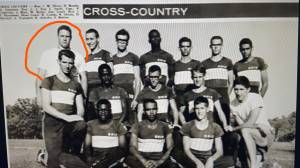 . Now check what those young men in the gaudy orange and white did under Huntsman—8th in 1972, 4th in 1973, 1st in 1974, 6th in 1975, 3rd in 1976 (when he was an assistant coach at the Montreal Olympics), 9th in 1979, 2nd in 1983, 3rd in 1981, 2nd in 1982 and 9th in 1985. That’s one national championship and several close calls. Huntsman’s teams were always in contention.
. Now check what those young men in the gaudy orange and white did under Huntsman—8th in 1972, 4th in 1973, 1st in 1974, 6th in 1975, 3rd in 1976 (when he was an assistant coach at the Montreal Olympics), 9th in 1979, 2nd in 1983, 3rd in 1981, 2nd in 1982 and 9th in 1985. That’s one national championship and several close calls. Huntsman’s teams were always in contention.
The ’85 NCAA meet was hosted by the University of Texas. It’s interesting that the Vols and the Horns (then coached by Cleburne Price) tied for 9th place. Huntsman had recently turned down an offer from Southern California, but he was willing to listen when Texas AD DeLoss Dodds made a pitch of his own. Price was in poor health and became one of Dodds’s many assistants before dying the next year. Would Stan be willing to leave UT and come to UT? The two men had known each other for a long time, even back to when Dodds was a quarter-miler at Kansas State. Huntsman, miffed that Tennessee AD Bob Woodruff had reneged on some unspecified promises, said he had a deal.
Texas, to be frank, possessed far more resources. Here in 2021, the school in Knoxville has a $1 billion endowment. By contrast, for the one in Austin you can multiply that by a factor of 31. Pretty good up side. The down side was that academics were tougher. Other than Vanderbilt, none of the SEC schools were and still are exactly brimming with Rhodes scholars. Many jocks who cannot get into Texas are welcomed with open arms at Mississippi State, South Carolina, Alabama—or Tennessee.
How did Huntsman do with the Longhorns? He quickly turned the program around as they finished 3rd in 1986, 2nd in 1987 and 1988 (albeit far behind UCLA both years), and 5th in 1989 and 1991. Arkansas, with the mad Irishman, John McDonnell, at the helm, had begun quite a run of success. His Razorbacks won national titles in 1985, 1992 to 1999 and 2003 to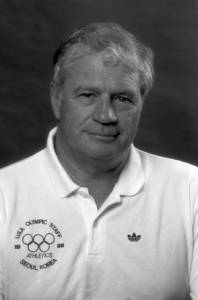 2005. Pardon my redundancy, but Arkansas, which moved to the SEC 30 years ago, is an academic backwater. That makes recruiting far easier. And McDonnell was adept at juggling scholarships and scoring enough points to win track meets and championships. At any rate, UT and UA had a spirited rivalry before the Hogs left the Southwest Conference.
2005. Pardon my redundancy, but Arkansas, which moved to the SEC 30 years ago, is an academic backwater. That makes recruiting far easier. And McDonnell was adept at juggling scholarships and scoring enough points to win track meets and championships. At any rate, UT and UA had a spirited rivalry before the Hogs left the Southwest Conference.
As mentioned earlier, Huntsman served as an assistant on the 1976 USA Olympic team. He had been tabbed for that honor again in 1980, but the Americans led a boycott of the Moscow Games. Why Huntsman was not one of Larry Ellis’s helpers in Los Angeles in 1984, I do not know. But he was the head coach for the following Olympiad—Seoul in 1988. His guys won seven individual gold medals and another for the 4 × 400 meter relay. Huntsman made no public comments about Canada’s Ben Johnson, who ran a steroid-aided world-record time in the 100 meters, got busted and was quickly put on a plane to Toronto.
Let me take a moment and say that I met Huntsman when I was working on my book, “For Texas, I Will” / The History of Memorial Stadium (1992). We met in his office a couple of times, and he made a favorable impression. I have encountered many people who have done far less but have bloated egos and much higher opinions of themselves. That was not his way. Furthermore, he sometimes saw me running laps at the stadium and actually watched! Stan Huntsman gave me running tips, knowing full well I was nothing but a slightly above-average central Texas road racer. Huntsman occasionally did similar things for athletes on opposing squads. That is the kind of sportsmanship I would like to see more of.
By 1991, the NCAA had begun limiting men’s track scholarships to 12.6, shrinking the sport. Coaching staffs were trimmed, as was practice time. It was not a money-maker, anyway, but how many sports are, besides football and men’s hoops? This disheartened Huntsman, who was somewhat of a track & field purist. He was determined to have a true team, not just a distance team, a sprint-and-relay team or a throwing team. Dodds later speculated that it may have been one of his reasons for retiring after the 1995 season. Having contributed 39 years to the sport at Ohio, Tennessee and Texas, his Olympics work and several international meets, the six-time national coach of the year had had enough.
A very even-keeled man, he nonetheless criticized the NCAA for its overemphasis on football and the schools’ inability or refusal to balance their budgets. When, in 2007, Ohio University eliminated four sports (including 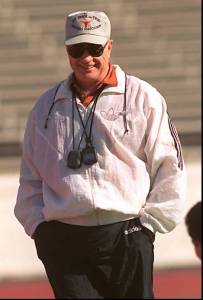 men’s outdoor and indoor track), he wrote a blistering letter. Furthermore, he returned the master’s degree he had earned in 1956 and demanded that his name be removed from the OU Sports Hall of Fame.
men’s outdoor and indoor track), he wrote a blistering letter. Furthermore, he returned the master’s degree he had earned in 1956 and demanded that his name be removed from the OU Sports Hall of Fame.
He was worried, for good reason, about the future of track in the USA. The college system had long been a natural and reliable feeder of athletic talent to the Olympic teams, men and women alike. But with the cutbacks of money and scholarships, there was an urgent need for some outside support as shown in other countries—none more egregious than Russia and China. A way of sustaining the next generation of sprinters, distance runners, hurdlers, pole-vaulters, high-jumpers, decathletes, shot-putters and the rest had to be found.
And yet the Americans continue to succeed. The USA won more gold medals—and more medals overall—than every other country in the 1992 Barcelona Games, the 1996 Atlanta Games, the 2000 Sydney Games, the 2004 Athens Games, the 2008 Beijing Games, the 2012 London Games and the 2016 Rio de Janeiro Games.
Huntsman suffered a stroke in 2014, and his sterling character was manifested once again. Respectful and deferring to his nurses and doctors, he never issued a single complaint. He battled for life, just as he had as a bruising fullback and track star at Wabash, and as a coach in the highest levels of his sport. He died on November 23, 2016. Huntsman’s funeral, at St. Theresa Catholic Church in Austin, drew 400 people from all over the world.

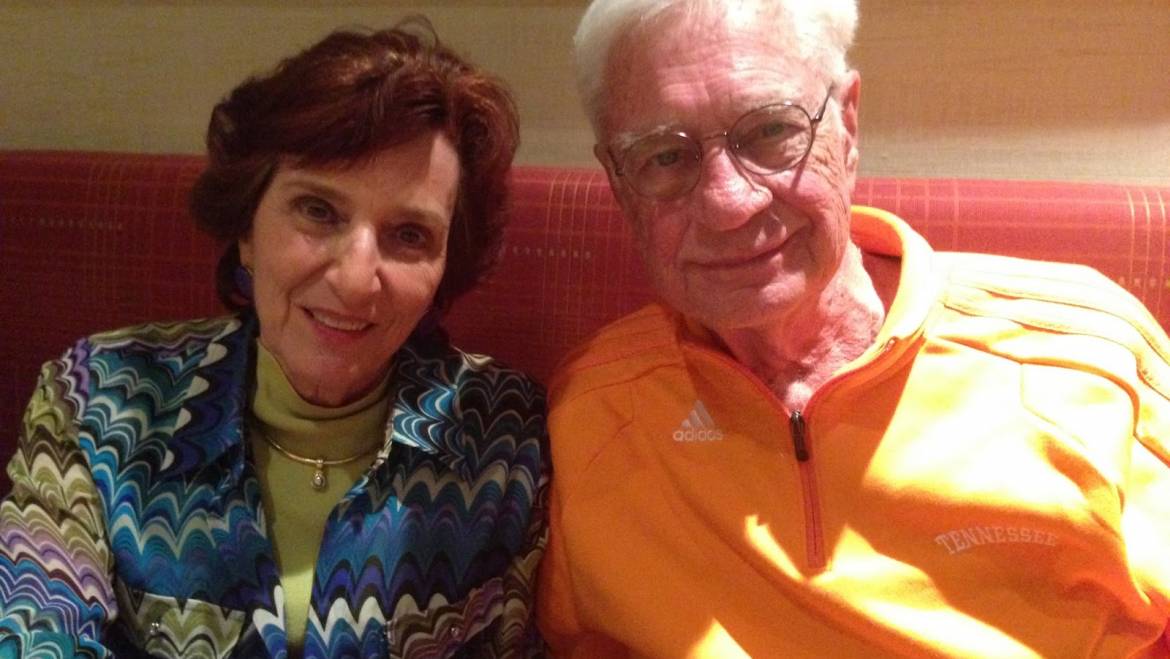
5 Comments
There are no words to describe how impressed I am with your knowledge, accuracy, insight, and ability to describe & give clarity to an extraordinary man. You have a gift for finding facts & recording accurately in a few words.
Thank you Fromm the bottom of my heart.
Sylvia, your opinion counts the most. I hope I did not get any of my facts (or interpretations thereof) wrong. I held Stan in high regard before I started researching and writing this article. But, as so often happens, I learned much more about him as an athlete, coach, person and etc. Think about it–him giving me a few tips while running laps at the stadium! He had other, far more important, things on his mind. I only wish I had spent more time with him.
Richard:
A remarkable story of an outstanding coach. Thank you. Again, your research and attention to detail are impeccable. Your writing style makes the reader feel he is a part of the article.
I actually know Chuck Rowe and have worked with him on a number of Nike football clinics. I knew he was a terrific track coach but 15 SWC titles in a row?
Best wishes,
Rex
Thank you, Rex! I agree that Rohe’s record at Tennessee is startling. It would have been five straight years of winning the SEC (not SWC) title in outdoor, indoor and cross-country. The Vols had some top 10 finishes in the NCAA’s too. Nevertheless, they did better under Huntsman.
Thanks for the look at Stan Huntsman’s career. He was my coach for 4 years at Ohio University. Mine was a short-term relationship compared to his long and varied coaching career, but I was up close.
We saw “coach” almost every day during track and cross country seasons (spring and fall), many days at 6:00 AM and then again at 3PM, and on weekend road trips. He definitely made himself available at odd hours and even attended workouts during the winter. For example when we trained for the Boston Marathon, one Saturday he drove us 20 miles out of town in his Buick and timed us as we ran past the waypoints along the road, and at the finish. He also gave us a sheet of daily workouts do do in the summer, and brought us back a week early in the fall to get ready for the XC season with twice-a-day workouts.
Coach had a relaxed manner, and only chewed us out once for loosing that I can remember during my time. He was very upset that we hadn’t done our best on that occasion. At the time it seemed out of character but I understand now. The thing is, he and his wife Sylvia welcomed us into their home and she was a very caring person, interested in us as human beings, not just runners. It was always a treat to be around her and Stan.
He could surprise me sometimes…for example he shared an office with the wrestling coach, who complained about having nobody to fill the lightweight slot. Knowing that I had been a passable wrestler in high school, and since we didn’t have an indoor track, he volunteered me. So by thinking outside the box, coach gave me a shot at NCAA wrestling, which I really enjoyed. But let’s face it – I was better at running. Maybe I just had a better coach…
“There are special places in our lives….just entering there in memory makes them live again…”. B. Frank, 2021
Thanks for the memories, Coach Stan Huntsman
Alex Jamieson, OU 1963 t0 1967.
North Vancouver, Canada
Add Comment